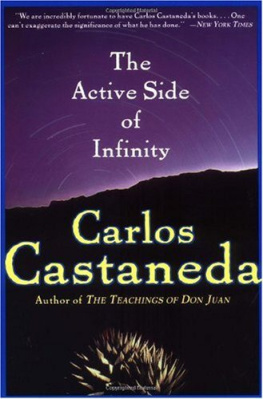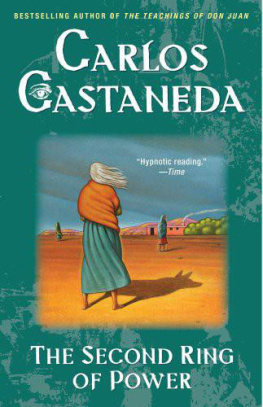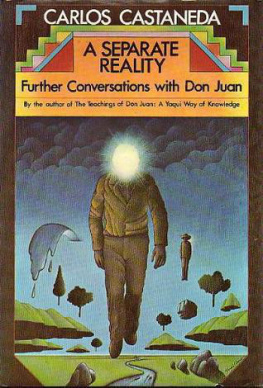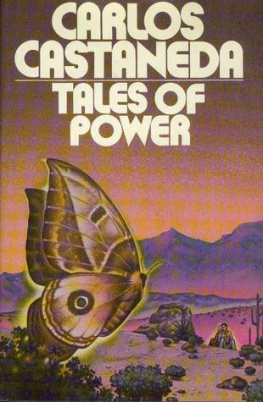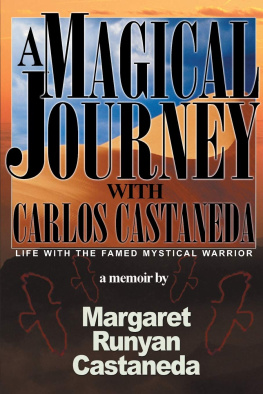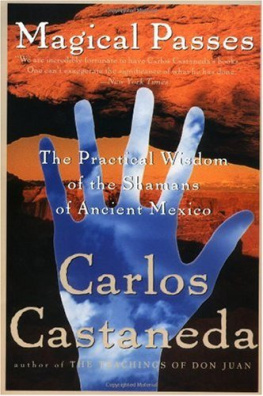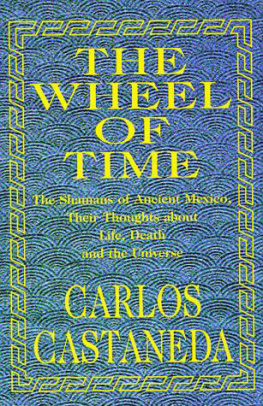THE ACTIVE SIDE OF INFINITY
The End of an Era
The Deep Concerns of Everyday Life
I went to Sonora to see don Juan. I had to discuss with him the most serious event of that moment in my life. I needed his advice.
When I arrived at his house, I barely went through the formality of greeting him. I sat down and blurted out my turmoil.
"Calm down, calm down," don Juan said. "Nothing can be that bad!"
"What's happening to me, don Juan?" I asked. It was a rhetorical question on my part.
"It is the workings of infinity," he replied. "Something happened to your way of perceiving the day you met me. Your sensation of nervousness is due to the subliminal realization that your time is up.
"You are aware of it, but not deliberately conscious of it. You feel the absence of time, and that makes you impatient.
"I know this, for it happened to me and to all the sorcerers of my lineage. At a given time, a whole era in my life or their lives ended. Now it's your turn. You have simply run out of time."
He demanded then a total account of whatever had happened to me. He said that it had to be a full account, sparing no details. He wasn't after sketchy descriptions. He wanted me to air the full impact of what was troubling me.
"Let's have this talk, as they say in your world, by the book," he said. "Let us enter into the realm of formal talks."
Don Juan explained that the shamans of ancient Mexico had developed the idea of formal versus informal talks, and used both of them as devices for teaching and guiding their disciples. Formal talks were, for them, summations that they made from time to time of everything that they had taught or said to their disciples. Informal talks were daily elucidations in which things were explained without reference to anything but the phenomenon itself under scrutiny.
"Sorcerers keep nothing to themselves," he continued. "To empty themselves in this fashion is a sorcerers' maneuver. It leads them to abandon the fortress of the self."
I began my story, telling don Juan that the circumstances of my life had never permitted me to be introspective. As far back in my past as I ccould remember, my daily life had been filled to the brim with pragmatic problems that had clamored for immediate resolution.
I remembered that my favorite uncle had told me that he was appalled at having found out that I had never received a gift for Christmas or for my birthday. I had come to live in my father's family's home not too long before my uncle made that statement. He commiserated with me about the unfairness of my situation. He even apologized, although it had nothing to do with him.
"It is disgusting, my boy," he said, shaking with feeling. "I want you to know that I am behind you one hundred percent whenever the moment comes to redress wrongdoings."
He insisted over and over that I had to forgive the people who had wronged me. From what he said, I formed the impression that he wanted me to confront my father with his finding and accuse him of indolence and neglect, and then, of course, forgive him.
My uncle failed to see that I didn't feel wronged at all. What he was asking me to do required an introspective nature that would make me respond to the barbs of psychological mistreatment once they were pointed out to me. I assured my uncle that I was going to think about it, but not at the moment; because, at that very instant my girlfriend was signaling me desperately to 'hurry up' from the living room where she was waiting for me.
I never had the opportunity to think about it, but my uncle must have talked to my father because I got a gift from him; a package neatly wrapped up with ribbon and all, and a little card that said "Sorry." I curiously and eagerly ripped the wrappings.
There was a cardboard box, and inside it there was a beautiful toy; a tiny boat with a winding key attached to the steam pipe. It could be used by children to play with while they took baths in the bathtub. My father had thoroughly forgotten that I was already fifteen years old, and was for all practical purposes a man.
Then, as I reached my adult years, I was still incapable of serious introspection. So it was quite a novelty when one day, years later, I found myself in the throes of a strange emotional agitation which seemed to increase as time went by. I discarded it, attributing it to natural processes of the mind or the body; processes that enter into action periodically for no reason at all, or are perhaps triggered by biochemical processes within the body itself. I thought nothing of it.
However, the agitation increased and its pressure forced me to believe that I had arrived at a moment in life when what I needed was a drastic change. There was something in me that demanded a rearrangement of my life. This urge to rearrange everything was familiar. I had felt it in the past, but it had been dormant for a long time.
I was committed to studying anthropology, and this commitment was so strong that not to study anthropology was never part of my proposed drastic change. It didn't occur to me to drop out of school and do something else. The first thing that came to mind was that I needed to change schools, and go somewhere else far away from Los Angeles.
Before I undertook a change of that magnitude, I wanted to test the waters, so to speak. I enrolled in a full summer load of classes at a school in another city. The most important course, for me, was a class in anthropology taught by a foremost authority on the Indians of the Andean region. It was my belief that if I focused my studies on an area that was emotionally accessible to me, I would have a better opportunity to do anthropological field-work in a serious manner when the time came. I considered my knowledge of South America as giving me a better entree into any given Indian society there.
At the same time that I registered for school, I got a job as a research assistant to a psychiatrist who was the older brother of one of my friends. He wanted to do a content analysis of excerpts from some innocuous [* innocuous- unlikely to harm or disturb anyone] tapes of 'question and answer' sessions with young men and women about their problems arising from overwork in school, unfulfilled expectations, not being understood at home, frustrating love affairs, etc. The tapes were over five years old and were going to be destroyed, but before they were, random numbers were allotted to each reel, and following a table of random numbers, reels were picked by the psychiatrist and his research assistants, and were scanned for excerpts that could be analyzed.
On the first day of class in the new school, the anthropology professor talked about his academic bona fides and dazzled his students with the scope of his knowledge and his publications. He was a tall, slender man in his mid-forties, with shifty blue eyes. What struck me the most about his physical appearance was that his eyes were rendered enormous behind glasses for correcting far-sightedness, and each of his eyes gave the impression that it was rotating in an opposite direction from the other when he moved his head as he spoke. I knew that that couldn't be true: It was, however, a very disconcerting image. He was extremely well dressed for an anthropologist, who in my day were famous for their super-casual attire. Archaeologists, for example, were described by their students as creatures lost in carbon-14 dating who never took a bath.
However, for reasons unbeknownst to me, what really set him apart wasn't his physical appearance, or his erudition, but his speech pattern. He pronounced every word as clearly as anyone I had ever heard, and emphasized certain words by elongating them. He had a markedly foreign intonation, but I knew that it was an affectation.
Next page
